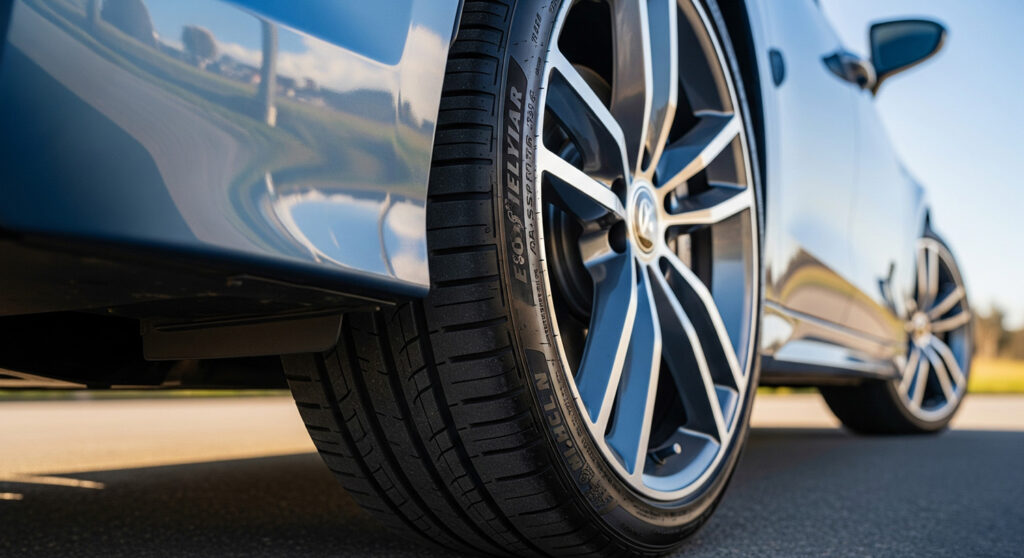Driving with winter tyres in summer is not prohibited, but can be expensive in an emergency. If an accident occurs, there is a risk of trouble if you have the wrong tyres, especially if you are (partly) responsible: Your comprehensive insurance can reduce or completely refuse benefits - possibly with reference to gross negligence.
In this article, we show you why winter tyres pose a safety risk at high temperatures, how this affects claims settlement and what you should definitely look out for in the event of an accident.
-
Although there is no obligation to drive with summer tyres in summer, there is a risk of a longer braking distance at high temperatures if the wrong tyres are fitted.
-
Higher fuel consumption and faster wear of winter tyres on hot roads also speak in favour of changing tyres in good time.
-
If you are not at fault for an accident and were driving with winter tyres in summer, the other party's motor vehicle liability insurance will usually still pay and settle the claim.
-
If you are at least partially at fault for the accident, your own comprehensive insurance may reduce your payment due to the unsuitable tyres.
-
We at fairforce.one will be happy to help you with any questions you may have and will check all claims 100 % for you free of charge.
Is driving with winter tyres allowed in summer?
Winter tyres should be driven according to the "O to O" formula from October to Easter and should therefore be changed around Easter.
In contrast to the winter tyre requirement, there is no statutory summer tyre requirement in summer.
Although it is generally permitted to drive with winter tyres in summer, it is not advisable. For these three reasons, driving with winter tyres in the summer months is dangerous:
- Longer braking distance: Summer and winter tyres differ significantly in the composition of the rubber compound. Winter tyres soften too much at high outside temperatures. This is due to the more elastic, softer rubber compound of winter tyres. The elasticity of the tyres, which is so valuable for the cold winter months, considerably extends the braking distance on dry roads in summer. Longer braking distances are a very common cause of rear-end collisions.
- Higher fuel consumptionDue to the more elastic tyre compound, the tyre rolls, sticks and works more, the rolling resistance is increased. In order to move the car, more engine power has to be called up - and this increases petrol consumption.
- Faster wearSofter tyres wear out more quickly in combination with dry, warm roads. The tread is worn out sooner and new tyres need to be purchased sooner. In addition to the higher costs, there is also an important ecological dimension: tyre wear is now regarded as a major factor in the high levels of particulate matter pollution in urban areas.
Ultimately, the material designed for winter can deform unintentionally at high temperatures and the tyres, especially the sidewalls, can lose stability as a result. This in turn results in poorer cornering behaviour for you.
For financial, environmental and safety reasons, it is therefore advisable not to use winter tyres in summer. However, there is no legal obligation to change from winter to summer tyres.
Good to know: Winter tyres are marked with an "M+S" and an "Alpine symbol". "M" stands for Mud (English for mud) and "S" for Snow (English for snow). This designation does not appear on summer tyres. Make sure you remember to change your tyres again in October. This is because winter tyres are compulsory in winter. Here you will find all the important information about Changing tyres in winter.
Accident victims like you get the best support from fairforce.one.
Have your accident reported now free of charge and without obligation by our regulation specialists.
Am I automatically at fault if I have an accident with winter tyres in summer?
Unfortunately, the wrong tyres, i.e. winter tyres in summer, can lead to an accident more quickly. Driving with winter tyres in summer can have a negative impact on the question of who is at fault. This also applies if you have otherwise adhered to the traffic rules in an exemplary manner. However, this does not mean that you are always entirely to blame for the accident.
Who is liable in the event of an accident with winter tyres in summer?
If an accident occurs with winter tyres in summer, the first reaction of the insurance company liable to pay benefits is often: "We won't pay you for the damage." In this context, it is often argued that you did not take the necessary care when choosing your tyres. In extreme cases, you may be accused of gross negligence and the insurance company may use this argument to refuse to cover the costs.
However, if you yourself have been the victim of an accident and have not contributed to the accident by braking or other actions, it often does not matter that you were driving on the wrong tyres. In this case, your driving style is typically less likely to be considered the cause of the accident. However, each case must be considered individually and examined carefully.
Does the insurance pay in the event of an accident with winter tyres in summer?
If you are the injured party and not the cause of the accident, the other party's motor vehicle liability insurance is responsible for settling the claim. If they become aware that you were driving with winter tyres in summer temperatures, the insurer may try to award you at least partial blame - whether this is true or not. However, motor vehicle liability insurance should generally pay out, even if the person concerned is still using winter tyres in summer. However, the situation is different with your own comprehensive insurance. This will cover you if you are at least partly responsible for the accident or if the accident was entirely your own fault. If your behaviour as a driver was grossly negligent, it is possible that the vehicle insurance will not cover the damage to your accident car, or will not cover it in full. After a rear-end collision caused by you, the insurance company may argue that the accident could only have happened with winter tyres in summer, as this increases the braking distance. As the driver, you acted with gross negligence in this constellation. Most comprehensive insurance contracts contain corresponding clauses on gross negligence.
Accident victims in your situation simply get the best support from fairforce.one.
Depending on the cause of the accident, customers receive an average of €4802 Additional payment
Callback within 5 minutes.
Steps towards fair claims settlement
Call us now free of charge at 0800 - 30 111 60 or have your claims checked directly online!
At fairforce.one, we give you the assurance that your matter will be examined and competently resolved for you exclusively by proven, customer-orientated traffic and insurance law specialists.
Contact us with just a few clicks and we will help you further. The fairforce.one network will enforce your claims and support you personally in all matters right through to full payment.
This is exactly why we founded fairforce.one. And that's exactly what has made us Germany's road accident settlement portal with the best customer ratings.
Frequently asked questions about winter tyres in summer
Is it permitted to drive with winter tyres in summer?
Yes, driving with winter tyres in summer is permitted in Germany. There is no legal obligation to use summer tyres - in contrast to the situational obligation to use winter tyres in winter. However, it is not recommended for safety and cost reasons.
learn moreWhat risks are there if I drive with winter tyres in summer?
Winter tyres have a longer braking distance in hot weather, less grip when cornering, higher fuel consumption and wear out more quickly. This can impair driving safety and be considered negligent behaviour in the event of an accident.
learn moreWho is liable in the event of an accident with winter tyres in summer?
In the event of accidents that are not your fault, the other party's motor vehicle liability insurance is generally liable - even if you were driving with winter tyres. However, if you are (partially) at fault for the accident, your own comprehensive insurance may reduce or refuse benefits.
learn moreCan the insurance company refuse to pay for winter tyres in summer?
Yes - especially in cases of gross negligence. If it can be proven that the accident was caused by the incorrect tyres (e.g. longer braking distance), the comprehensive insurance may reduce or refuse to pay benefits.
learn moreAm I automatically at fault if I cause an accident with winter tyres in summer?
No, but your choice of tyres may be considered a contributory cause in individual cases. The question of fault is clarified on the basis of the specific circumstances of the accident - the wrong tyres can justify partial fault.
learn more




